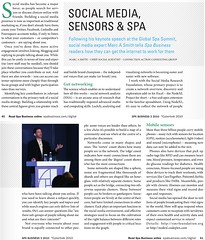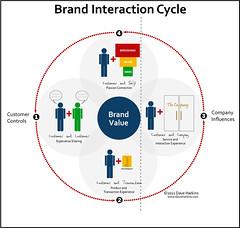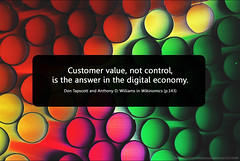 |
| Courtesy of |
By Hector Cisneros
Most people know what equity is. For a business, it's the net difference between the assets and liabilities a company has. We've also heard of sweat equity, where a person does a portion or all of the work when fixing up their home, business or other projects. So then, what is social equity? In the word-of-mouth world, social equity refers to the notion, which people often feel a need to reciprocate for the help received. It’s when they believe they were befriended by someone and have a feeling of indebtedness. It’s a psychological debt that they feel they need to return the favor. You’ve heard people say “I owe you one,” right?
In this article, I will use the term social equity in a little bit different way. I am using it to describe the total branding value that your social networks produce for your business or trade name. How social equity can increase or decrease your business brand value. I will explain how it directly affects your company’s monetary value, and your ability to get top dollar for your company when it’s time to sell! I will also show how the role of social media can play a vital role in evaluating that all elusive business’ Brand value.
What a Business Broker Looks at
| 2010 - 09 - 07 - Spa Business Article - Marc Smith on Social Media (Photo credit: Marc_Smith) |
Most businesses today strive to brand themselves in one way or another. Branding should be a way of life for any business. However, a brand only has value if it is recognizable by a large segment of the population. In the past companies have spent large amounts of money researching and surveying people to determine how their brand is doing.
Research and Surveying Play a Vital Role
Today, researching and surveying a brand is easier than ever. The rise of the internet has changed the game forever. And now social networks have taken brand awareness to a whole new level. Social media
There is nothing like having a large client base with large numbers of long-term contracts producing large cash flow to make a buyers' eyes light up. However, social network followers may soon change this perception. We can now measure customer loyalty by measuring the number of positive interactions a company has with its clients through social media.
Example of Brand Value
| Brand Interaction Cycle (Photo credit: DaveHarkins) |
Follow the Footprints
| Foot Prints (Photo credit: buck82) |
Rating Sites Matter!
Value in and of Itself
Databases That Pay Dividends
Smart Business owners (and business brokers) are starting to realize how valuable a large social network can be to a company. They are now seeing how it can be a marketing tool, a credibility-building tool, a customer support tool, and a way to build customer loyalty. It is a great way to measure and test perceived product value and company brand. They also realize that most aspects of the social networks are measurable and track-able giving the business owner (and broker) one more way to gauge customer loyalty.
 In this article, I proposed that having a large social network is not
only valuable to any business as a marketing tool, it is an asset that can be
used to gauge customer loyalty and many other valuable indicators of customer
relationships. These interactions can provide insight into the viability of a
business purchase. If you are a business broker who is using social media as
another way to gauge a business sell-ability, let me know. Right now, you
are a rare breed. If you’re a business owner and you have little or no social
network following, wake up and smell the coffee. Social media is the fastest-growing segment of the internet today and is one of the lowest cost marketing
tools on the Internet!
In this article, I proposed that having a large social network is not
only valuable to any business as a marketing tool, it is an asset that can be
used to gauge customer loyalty and many other valuable indicators of customer
relationships. These interactions can provide insight into the viability of a
business purchase. If you are a business broker who is using social media as
another way to gauge a business sell-ability, let me know. Right now, you
are a rare breed. If you’re a business owner and you have little or no social
network following, wake up and smell the coffee. Social media is the fastest-growing segment of the internet today and is one of the lowest cost marketing
tools on the Internet!I hope this article raised your awareness of the value social networks can play in a business purchase. If you like this article, leave us a comment letting us know what you liked. If you have a different opinion, let us know that too. Either way, share your thoughts with our readers.
 |
| Courtesy of |
If you would like to find more articles like
this type in your key phrase in the search box at the top left of this blog. If
you found this article useful, share it with your friends, families and
co-works. If you have a comment related to this article, leave it in the
comment sections below. If you would like a free copy of our book, "Internet Marketing Tips for
the 21st Century", fill out the form below.
Hector Cisneros is COO and Director of Social Media Marketing at Working the Web to Win, an award-winning Internet marketing company based in Jacksonville, Florida. He is also the co-host of the weekly Internet radio show, "Working the Web To Win" on BlogTalkRadio.com, which airs every Tuesday at 4 p.m. Eastern. Hector is a syndicated writer and published author of “60 Seconds to Success.”
Hector Cisneros is COO and Director of Social Media Marketing at Working the Web to Win, an award-winning Internet marketing company based in Jacksonville, Florida. He is also the co-host of the weekly Internet radio show, "Working the Web To Win" on BlogTalkRadio.com, which airs every Tuesday at 4 p.m. Eastern. Hector is a syndicated writer and published author of “60 Seconds to Success.”
Related articles






I am a new user of this site so here i saw multiple articles and posts posted by this site,I curious more interest in some of them hope you will give more information on this topics in your next articles. eisapplication
ReplyDelete
ReplyDeleteAwesome blog. Thanks for sharing such a worthy information...
Advantages of Marketing on Social media
advantages of using social media as a marketing tool